Definition of Persons under Income Tax Act, 1961

Under Section 2 (31), ‘Person’ is an AOP or Association of Persons or BOI (Body of Individuals) or a Local Authority or an artificial judicial person, or not, that Person or Body or Authorities or a Legal Person, was established or merged for revenue, profit or gains. In this article, we will the definition of persons under Income Tax Act, 1961.
- Definition of Persons under Income Tax Act, 1961
- Meaning of the definition
- Every Assessee is a Person but every person is not an assessee
- Final words
Definition of Persons under Income Tax Act, 1961
In terms of section 2 (31) of the Income-tax Act a person includes:
- Individuals
- Partnership Firms
- HUF
- Company
- An individual organization or body of persons whether incorporated or not.
- Local authorities
- Any other legal person who is not subject to any of the above clauses
The assessee is the person responsible for paying any taxes and any other fees specified under the law.
Meaning of the definition
In the above section, it can be noted that man includes not only a natural person but also a person of the artificial judicial person. The types of people mentioned under the categories are described below.
- Individuals: Individuals refer to natural persons whether male or female or transgender, minor or major, resident or non-resident
- A partnership firm is a contractual relationship between two or more; persons who have agreed to conduct business on behalf of all or any of them on behalf of all to share the profits made by the business. LLP is also considered to be a corporation under the Income-tax act of 1961.
- HUF: Hindu Undivided Family (HUF) is a family business covered by Hindu law rules that include all people in a lineage from the same family as Karta and members as coparceners. Jain and Sikh families are also considered HUF under this act.
- Company: A company is a legal entity established under the Companies Act, 2013 or any other previous act. Companies include Any Indian Company Foreign Company Parent, Partner or Subsidiary Legal Company Public Company, any other type of company,
- An association or individual body: A group of people means a group of people united to achieve the same goal by operating the same principle. AOP members can be natural persons or judges.
- Local authorities: Local authorities are a legally responsible organization of public services designed to provide services in a particular area.
Every Assessee is a Person but every person is not an assessee
It is very important. An assessee is a person who is responsible for paying taxes, either on his or her income or with others. But that does not mean that everyone should pay taxes.
If you are an individual and your total income is below the income limit as per income tax, then you have no obligation to pay taxes.
If your income is not available then you are not responsible for remittances and refunds. If so, you are not an assessee but he is a person.

Final words
Some examples of the above-mentioned categories-
- Artificial Judicial Person: Calcutta University
- Company: Asian Paints
- Individual body: A and B are the legal heirs of C. C who died in 2018 and A and B ran his business without entering into a joint venture.
- Partnership Firm: Shri Krishna Enterprises, a joint venture of three partners S, K, and P
- HUF: Joint family including P, Mrs. P, and their son S
- Local authority: Municipal Corporation
The above examples clear the meaning of the definition of persons under the Income Tax Act, 1961. Hope this makes your concept clear for the term ‘persons’.
Company Secretary and diligent learner deeply immersed in the world of corporate law, compliance, and governance with a focus on developing a robust foundation in legal principles and corporate practices. Passionate about exploring the intricacies of company law, regulatory compliance, and corporate governance.



